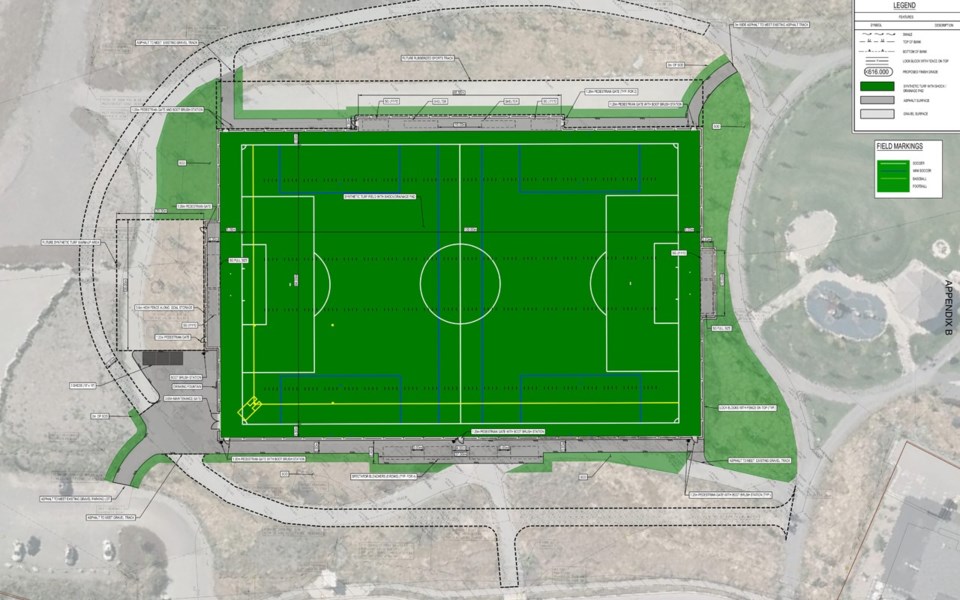Though some in the community still have questions and concerns, the Resort Municipality of Whistler (RMOW) will move forward with an artificial turf field after council confirmed the site at Bayly Park in Cheakamus Crossing at its Nov. 21 meeting.
The total project cost is now estimated at $2,715,000, to be funded from the General Capital Reserves. The estimate includes the field, fencing, illumination, alternative infill product, provision of potable water service, landscaping, contingency and professional fees.
The decision passed by a unanimous vote of 6-0 (Councillor Sue Maxwell was absent).
The vote followed another lengthy presentation on the project from manager of resort parks planning Martin Pardoe, and another lengthy discussion from the council table.
Though some councillors agreed they wished the location was near a school, and there are still concerns about crumb rubber infill, the consensus at the table was one of support.
"This is not an easy decision, but when I compare it with other decisions that we've made at this table in the last three years, we replaced the roof for Meadow Park, no one had a problem with that. We installed the skate park, no one really had a problem with that, because those were great additions to our community and the skate park got kids playing outside," said Coun. Jen Ford.
"I'm being approached by as many people for as are against, and so I think that it's important to show that these are not decisions just being lightly entered into by any of us."
Having just been elected last month, Coun. Cathy Jewett hasn't been involved in the decision making process around the field to this point, but noted it was a big issue during the byelection.
"I still feel conflicted about it. I've been looking at different ways of recycling the product... I have some concerns around that," Jewett said.
"I think that for the people that are using it this is the best solution, but as far as our environment, that's where the conflict lies, for sure... I trust that staff will work hard to make this the most environmental project possible given what we're trying to accomplish."
The turf product should be expected to be replaced every 10 to 15 years depending on intensity of use and UV exposure — the cost for that being about $800,000.
Annual operating costs are expected to be in the $25,000 to $35,000 range, and include hydro for the lights.
Operating costs can be partially or fully offset by charging user fees. In the Lower Mainland, comparable user fees average about $30/hour for youth and $60/hour for adults.
For reference, the RMOW's existing grass fields cost about $20,000 per year, a portion of which is offset by user fees (for comparison, the ice arena at MPSC is subsidized by taxpayers to the tune of $600,000 per year, excluding equipment replacement and repairs).
Some concerns around the Bayly Park site included resettlement of the old dump and pressures on parking.
But an analysis of the site found that the "vast majority" of resettlement has already occurred, Pardoe said in his presentation.
The existing gravel parking lot can hold about 60 cars and is used by Bayly Park users, Whistler Sport Legacies and neighbourhood residents. With the field coming online and more housing on the way, the RMOW suggests monitoring the lot and considering improvements in the future if necessary (the cost for parking lot improvements is not included in the current budget).
Earlier in the meeting, three Whistlerites asked questions about the project, including the engagement process, potential alternatives to crumb rubber infill and how artificial turf fits into the resort's guiding sustainability document Whistler2020.
In regards to the last point, Mayor Nancy Wilhelm-Morden noted that a Whistler2020 analysis has been done for the project.
"Just about every recreational amenity we have in this town has some sort of environmental footprint attached to it, and it's a case of reducing or mitigating," the mayor said.
Though Vancouver Coastal Health has stated it has no concerns about perceived health risks around crumb rubber infill, the RMOW could consider a different in-fill product for the field.
Alternatives are available at a cost of $150,000 to $200,000, which has been included in the $2,715,000 draft budget.
Council will choose the material when it awards the construction tender for the field.
A submission was made to the Union of BC Municipalities' Gas Tax fund for 100-per-cent of the project funding. Announcements are expected in January 2018. If successful, the money would be used to offset the stated capital costs of the project rather than expand its scope.
Other external funding options have been "anecdotally mentioned," and could include the Whistler Blackcomb Foundation, turf suppliers (through sponsorship opportunities), local contractors or fundraising from the Whistler Youth Soccer Club.
The project will now move to the design, development and tender phase, with a goal to start construction on May 1, 2018.
Barring any setbacks, the field will be completed by the end of August 2018.
To view the full report and discussion, head to www.whistler.ca/municipal-gov/council/watch-council-meetings.




